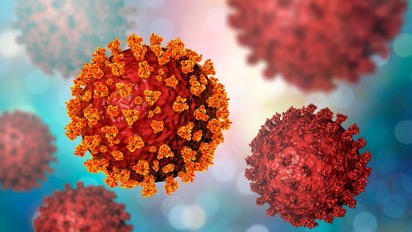COVID-19 recovery disparities uncovered among racial and ethnic groups
February 6, 2024
Source: drugdu
 349
349
 In a recent study published in Frontiers in Public Health, researchers from the United States of America (US) investigated the racial and ethnic variation in symptoms, activity level, health status, and missed work.
In a recent study published in Frontiers in Public Health, researchers from the United States of America (US) investigated the racial and ethnic variation in symptoms, activity level, health status, and missed work.
They assessed this via follow-ups post-initial infection with severe acute respiratory syndrome coronavirus 2 (SARS-CoV-2). Although the symptoms were equally prevalent among the groups, they found that three and six months post-infection, Hispanic participants reported poorer health and reduced activity compared to non-Hispanic participants.
Further, racial minority participants reported more negative impacts on health status, activity, and absence from work as compared to the White population.
Background
The coronavirus disease 2019 (COVID-19) pandemic highlighted disparities, wherein ethnic and racial minoritized populations were observed to face greater infection risks due to the essential nature of their work, limited remote work options, and challenges in practicing social distancing.
The infected individuals faced barriers to care, including underinsurance and lack of primary care, with economic consequences. Disparities persisted in health outcomes, for example, higher hospitalization and mortality rates among Black and Hispanic populations.
Despite these challenges, recovery-related differences after SARS-CoV-2 infection remained understudied, with existing studies having limitations like varied follow-up durations, inconsistent findings, and insufficient consideration of social health determinants.
Researchers in the present study aimed to address this gap. The study assessed symptoms and health-related effects following SARS-CoV-2 infection across ethnicities and races, aiming to guide equitable health interventions effectively.
About the study
In the present study, a secondary analysis was performed using data from a US-based, prospective, multicenter, longitudinal cohort study named Innovative Support for Patients with SARS-CoV-2 Infections Registry (INSPIRE). The primary cohort involved adults positive for SARS-CoV-2 infection enrolled from December 2020 to July 2022, along with a SARS-CoV-2-negative group for considering non-SARS-CoV-2-related effects.
A total of 3,161 participants completed enrollment and reported symptoms and other outcomes every three months via surveys. Out of these participants, 2,402 were SARS-CoV-2-positive and 759 SARS-CoV-2-negative.
Among the SARS-CoV-2-positive participants, 14.0% were Hispanic, 11.0% were Asian, 7.9% were Black, 9.9% were categorized as Other/Multiple races, and 71.1% were White. Among the SARS-CoV-2-negative participants, 16.5% were Hispanic, 14.8% were Asian, 13.1% were Black, 8.1% were categorized as Other/Multiple races, and 64% were White.
The researchers evaluated 21 COVID-19-like symptoms and "other symptoms" at enrollment and three and six months post-infection using the Centers for Disease Control and Prevention's symptom list.
During the follow-ups, health status (rated on a 5-point scale from excellent to poor), activity level compared to pre-SARS-CoV-2 symptoms (same, somewhat less, much less), and missed work in the past three months (categorized into workdays) were assessed.
Data were collected on ethnicity and race. Interactions between ethnicity or race and SARS-CoV-2 infection status were considered.
Generalized estimating equations (GEE) logistic regression was used to estimate marginal odds ratios (ORs) for various outcomes, adjusting for SARS-CoV-2 infection status, demographic factors, substance use, social determinants of health, pre-existing health conditions, COVID-19 vaccination status, and survey time point.
Results and discussion
Post SARS-CoV-2 infection, symptoms were found to be mostly similar across ethnic and racial groups over time. At three months, Hispanic individuals had higher odds of reporting fair/poor health (OR = 1.94) and reduced activity compared to their non-Hispanic counterparts. No significant differences by ethnicity were observed at six months.
At three months, participants of Other/Multiple races had higher odds of reporting fair/poor health (OR = 1.9) and reduced activity compared to White participants. At six months, Asian participants had a greater probability of reporting fair/poor health (OR = 1.88), Black individuals reported more missed work (OR = 2.83), and Other/Multiple race participants reported more health issues (OR = 1.83), reduced activity, and missed work (OR = 2.25).
The findings help to improve our understanding of the ethnic and racial disparities in outcomes after SARS-CoV-2 infection and could be used to inform clinical and public health initiatives and policy.
However, the study is limited by small sample sizes in ethnic and racial subgroups, lack of adjustment for insurance and frontline worker status, potential participant representativeness issues, variations in response rates, lack of exploration of neurological and mental health sequelae, recruitment at different pandemic stages, and the absence of adjustments for multiple comparisons.
Conclusion
In conclusion, the findings suggest that while the symptom prevalence was similar among the groups, the ethnic and racial minority groups suffered adverse effects on health status, activity level, and absence from work as compared to non-Hispanic and White populations, respectively.
Examining the underlying factors contributing to these differences could aid the efforts to promote health equity and improve our preparedness for future pandemics.
Source:
https://www.news-medical.net/news/20240204/COVID-19-recovery-disparities-uncovered-among-racial-and-ethnic-groups.aspx
Read more on
- Gusekirumab Injection Accepted by CDE, Multiple Pipelines Advancing Simultaneously March 4, 2026
- Yifan Pharmaceutical’s teriparatide injection has been accepted by the CDE (Center for Drug Evaluation), adding a new domestic player to the osteoporosis treatment field March 4, 2026
- //news.yaozh.com/archive/47318.html PD-1 sales surge March 4, 2026
- A major breakthrough! Roche’s oral BTK inhibitor achieves its third Phase III clinical trial victory, a game-changer in the multi-billion dollar MS (manufactured pharmaceuticals) market. March 4, 2026
- GB19 Injection Approved for Clinical Trials of Cutaneous Lupus Erythematosus March 4, 2026
your submission has already been received.
OK
Subscribe
Please enter a valid Email address!
Submit
The most relevant industry news & insight will be sent to you every two weeks.



